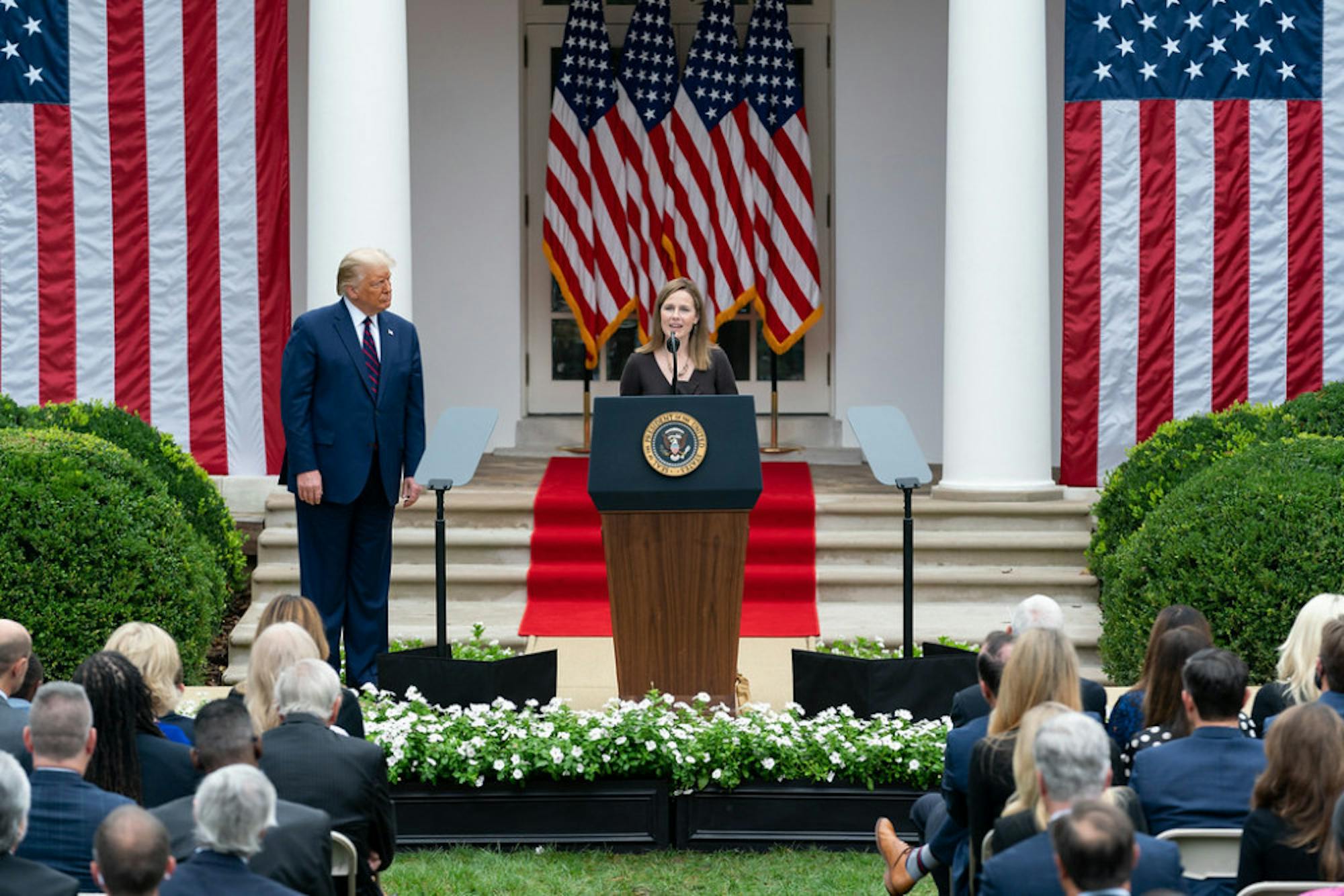Following weeks of controversy, President Donald Trump’s nominee to fill the late Justice Ruth Bader Ginsburg’s seat on the Supreme Court, Judge Amy Coney Barrett, has finally completed her confirmation hearings. Even before her nomination, Trump declared that his pick “will be a woman, a very talented, a very brilliant woman.”
Superficially, his logic makes sense: the loss of one minority representative justifies their replacement by another similar minority. Barrett and Ginsburg, however, are nowhere near equivalent. Ginsburg dedicated much of her career to defending overlooked populations, particularly women. It may appear that Trump’s nomination is intended to add to the court a powerful woman that fights for everyone, but Barrett’s womanhood does not make her an automatic champion of women’s rights.
If anything, her nomination actively opposes Ginsburg’s progessive legacy. With her baked-in conservatism and strict religious ideals, Barrett is the antithesis of Ginsburg. If her nomination proves successful, she could very well spend decades reducing legal equity. Barrett claims she is “committed to the role of law and the role of the Supreme Court in dispensing equal justice for all.” Her record, however, calls her alleged judicial equity into question.
When ruling on the issue of abortion, Barrett has chosen to restrict abortion rights on multiple occasions. She signed dissents “asking for decisions blocking laws enacted by abortion opponents to be thrown out and reheard by the full appeals court” twice. Similarly, in 2019, Barrett joined a dissent that would have made “it easier for men alleged to have committed sexual assaults on campus to challenge the proceedings against them.” Her continued attempts to restrict women’s rights indicate that she could never live up to Ginsburg’s crusades for inclusion.

With a seat on the Supreme Court, Barrett would likely rule on hot-button issues like the Affordable Care Act and the ruling of Roe v. Wade. While it’s traditional for nominees to avoid discussing how they would decide specific issues, Barrett’s support for anti-abortion organizations and subtle indications of her views on the Affordable Care Act nevertheless indicate her likely willingness to restrict such rights. Barrett’s constructive politics contrast starkly from Ginsburg’s. Ginsburg, throughout her career, oversaw 300 sex discrimination cases, founded the Women’s Rights Project of the American Civil Liberties Union, and sustained heavy influence in landmark cases for non-discriminatory policy like United States v. Virginiaand Obergefell v. Hodges.It is clear to see that where Ginsburg fought to expand rights, Barrett will endeavor to limit them.
A seat on the Supreme Court confers both the responsibility to interpret the Constitution and the power to radically reshape Americans’ daily lives. In an era of increasingly conservative jurisprudence, the rights to abort, immigrate and receive adequate health care are more vulnerable than ever. Barrett’s agendas and actions contradict Trump’s shallow view that installing a woman in a position of power is equivalent to securing women’s rights. Nominating Barrett is not inherently feminist. She has repeatedly used her power over women and other marginalized groups to limit their freedoms — not expand them.
Politics aside, a seat on the Supreme Court sits empty. For whoever is the next occupant of the seat, judicial accountability must be upheld. At times, the Supreme Court seems distant and daunting, but where accountability and protection lack on the Supreme Court, we as individuals must pick up the slack. If our justices do not fight for the causes of the greater good, we still can. And when that seat is finally filled, let’s make sure that it is filled with an ally of equitable justice and impartiality. Hopefully, someone who actually knows what the First Amendment protects.
Lena Bodenhamer (24C) is from Fort Collins, Colorado.








